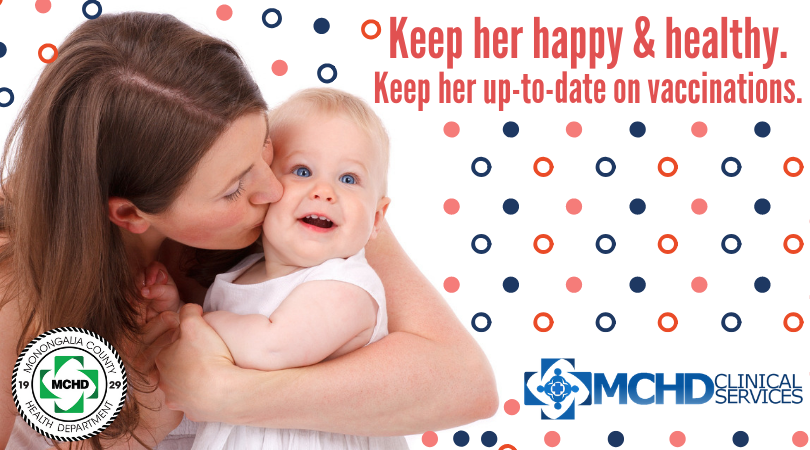Immunizations for babies lay the foundation for the fight against disease

Aug. 14, 2019
By Mary Wade Burnside
Sure, kids hate getting shots. I remember convincing my sister to politely ask our pediatrician to forego our vaccines during one appointment. In my toddler mind, I thought that would do the trick to avoid a nurse sticking a needle into my arm.
I was wrong. What I didn’t realize at the time was that a few uncomfortable moments could spare me a bout with an unpleasant illness—one that not only made me feel sick but also that my sister could catch, keeping my mother home from work taking care of us.
These days, parents have an arsenal to help them combat 14 harmful and potentially deadly diseases that their kids can be exposed to at home, during a play-date with a friend, at day care or at preschool. And all before their children hit the terrible twos. Most parents agree that inoculating their offspring against diseases such as measles, chickenpox and whooping cough is the right thing to do. According to the Centers for Disease Control and Prevention, nine out of 10 people have their children vaccinated according to an immunization schedule or intend to do so.
And that is in spite of the fact that most young parents have never seen the devastating effects that measles can have on a family and the surrounding community. The current United States measles outbreak serves as a reminder of how quickly infectious diseases can spread when they reach groups of unvaccinated people. And that’s a tragedy, because vaccines are thoroughly tested before licensing and monitored after licensing to make sure they are safe.
Unfortunately, the measles outbreak does illustrate that people sometimes become complacent when they forget how commonplace those diseases were before the widespread availability of vaccines. Many of them also never saw complications associated with illnesses such as measles.
Measles is highly contagious and can be dangerous, especially for babies and young children. According to the CDC, one out of four people who get measles will be hospitalized, one out of every 1,000 who get measles will develop brain swelling due to an infection called encephalitis—which may lead to brain damage—and one or two out of 1,000 people with measles will die, even with the best care.
Measles was declared eliminated in the United States in 2000. Then travelers brought it back from other countries and it was spread to communities with larger-than-normal numbers of people who did not get vaccinated, perhaps for religious, philosophical or personal reasons. The MMR vaccine—when administered according to the CDC’s immunization schedule—provides children with protection from measles, mumps and rubella.
Another disease that has made recent headlines is pertussis, better known as whooping cough. There was an outbreak as recently as 2012, according to the CDC. Pertussis can cause serious and sometimes deadly complications for babies and young children, especially those who are not fully vaccinated. Complications include:
• 1 out of 2 babies younger than the age of 1 will need hospital care
• 1 out of 4 will get pneumonia
• 1 out of 100 will experience convulsions
• 3 out of 5 will have apnea, or slowed or stopped breathing
• 1 out of 300 will have encephalopathy, or disease of the brain
• 1 out of 100 will die
The DTaP vaccine, administered at 2 months, 4 months, 6 months, 15 through 18 months and through the ages of 4 and 6, not only protects against whooping cough, but also diphtheria and tetanus. If a child falls behind schedule, he or she can get the Tdap vaccine after the age of 6.
These are just two of the common childhood illnesses that vaccines can prevent or make symptoms less severe. Vaccines are the safest and most effective way to protect children from these diseases. Parents can provide the best protection by following the recommended immunization schedule, giving children the vaccines they need when they need them.
And while Hepatitis A and Hepatitis B might never have been considered childhood illnesses, there is currently a Hep A outbreak in southern West Virginia that health officials have been battling. And Hepatitis B is on the rise, with West Virginia having the highest rate of the illness in the country.
It might seem overwhelming, but the CDC has prepared a graph and chart, detailing the 14 diseases prevented by vaccines before the age of 2 in an easy-to-read format. And all vaccines used in the United States require extensive safety testing before they are licensed by the U.S. Food and Drug Administration (FDA).
For more information on vaccines, contact your health care provider. To make an appointment for vaccines, call MCHD Clinical Services at 304-598-5119. We have vaccine clinics on Thursday and Friday this week and Tuesday, Thursday and Friday next week. And if you are sending your children back to school, information on West Virginia school immunization requirements can be found on our website.
Mary Wade Burnside is the public information officer for Monongalia County Health Department.